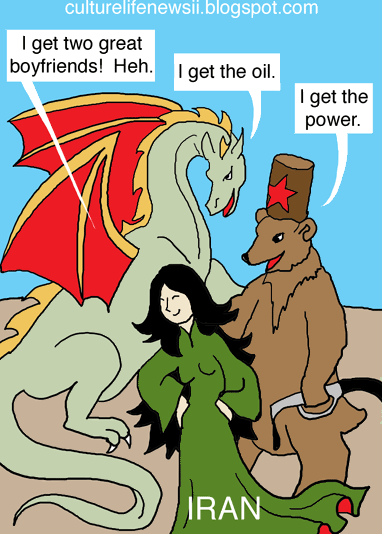


Form right: Iranian President Hassan Rouhani, Chinese President Xi Jinping and Russian President Vladimir Putin at a security conference in Shanghai, China, May, 2014.
Every year, the world’s most powerful people meet in secret. Their agenda: total world domination. Big media observe a near-total blackout. It sounds like dystopian science fiction, or a conspiracy theorist’s worst nightmare. The strangest part is that it’s true. The 2011 destabilization of Syria, the 9/11/2008 Goldman-Sachs-led controlled demolition of the world economy, and probably even the 9/11 false flag events were all plotted or okayed by the Bilderbergers.
Fortunately, the world is fighting back. The rise of the internet-based alternative media has shredded the secrecy surrounding the annual Bilderberg conference, allowing the people a glimpse of what their masters have in store for them. And the nations resisting the Bilderbergers’ world takeover attempt, led by Iran, Russia and China, are gaining ground.
That is why this year’s Bilderberg conference in Copenhagen, Denmark, which ended on June 1st, was an exercise in damage control. The Bilderbergers’ first concern, according to journalist Daniel Estulin, is the rise of Iran, Russia and China. The gas deal between Russia and China – and Iran and Russia’s successful defense of Syria against NATO-led aggression – have raised grave questions about whether the Bilderberg-led West can continue its world-domination scheme.
May 2014 brought bad news for the Bilderbergers. Russia, stung by NATO skullduggery in Ukraine, announced that it is spearheading a new Eurasian Economic Union. Meanwhile, China has just called for an Asian Security Alliance that would include Russia and Iran. All of this, on top of the Russia-China gas pipeline deal, suggests that the world is spinning out of the Bilderbergers’ control.
Bilderberg’s New World Order plot hits Iran-Russia-China wall
US tries to force China to keep US reserve currency: Analyst
-
-
-
-
-
-
-
-
-
China’s president called Tuesday for the creation of a new Asian structure for security cooperation based on a regional group that includes Russia and Iran and excludes the United States.
President Xi Jinping spoke at a meeting in Shanghai of the Conference on Interaction and Confidence-building in Asia (CICA), an group that has taken on significance as Beijing tries to extend its influence and limit the role of the United States, which it sees as a strategic rival.
“We need to innovate our security cooperation (and) establish new regional security cooperation architecture,” said Xi, speaking to an audience that included President Vladimir Putin of Russia and leaders of Central Asian countries.
CICA, whose 24 member nations also include Korea, Thailand and Turkey, should become a “security dialogue and cooperation platform” and should “establish a defense consultation mechanism,” Xi said. He said it should create a “security response center” for major emergencies.
The proposal marks the latest effort by Beijing to build up groups of Asian or developing governments to offset the influence of the United States and other Western governments in global affairs.
In 2001, it founded the Shanghai Cooperation Organization with Russia and four Central Asia nations to counterbalance rising American influence in the region and to combat Islamic and separatist political movements. Beijing also is a force in the BRICS group of major developing countries with Russia, India, Brazil and South Africa.
The Eurasian Economic Union (EaEU), also known as the Eurasian Union (EaU), is an economic union founded by a treaty signed on May 29, 2014 between the leaders of Kazakhstan, Russia and Belarus. The Union will go into effect on January 1, 2015 if the treaty is approved by each country’s parliaments.
The EaEU will create a single economic market of 170 million people and a gross domestic product of 2.7 trillion dollars. Armenia, Kyrgyzstan, Tajikistan and Uzbekistan have also expressed interest in joining the organization.
If there was one takeaway from Russia’s annual economic shindig in St Petersburg last week, it was that the country is continually looking to its neighbor China for trade and investment. While the United States can’t claim that it might be losing a friend with Russia’s pivot east, it might be a different story for the dollar, with the alliance having the potential to undercut the domination of the U.S. currency.
Russia Holds “De-Dollarization Meeting”: China, Iran Willing To Drop US Dollar From Bilateral Trade
China, Iran and Russia: Restructuring the global order
What is CICA (and Why Does China Care About It)?
Eurasian Economic Union is wake-up call for US
What Russia-China relations mean for the dollar
China calls for new security pact with Russia, Iran
Syria
Syrian presidential election, 2014
Syria election: Refugees vote in Lebanon and Jordan
This is what the Syrian election looks like in Lebanon
Ukraine
Rebels Kill 14 Downing Ukraine Chopper as Russia Sees War
Threat of war between Ukraine and Russia
Russia warns of ‘fratricidal war’ in Ukraine
Slavyansk kids escape to Russia from Kiev’s shelling
Filed under: Uncategorized
